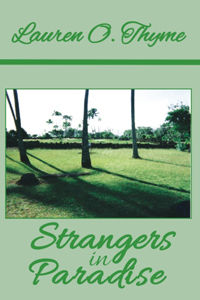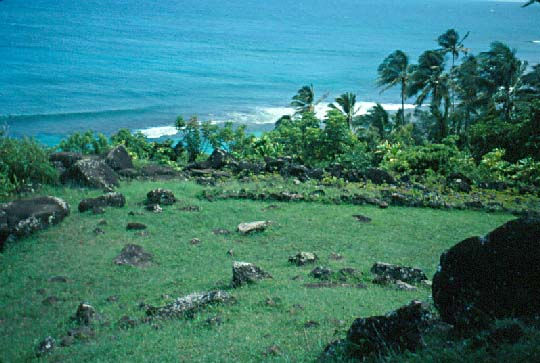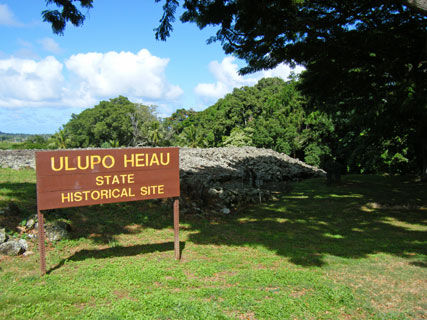HAWAII: ADVENTURES IN SACRED PARADISE
- Lauren Thyme

- Dec 3, 2020
- 7 min read

Holoholoku heiau depicted on my book cover
The first sacred site I ever visited consciously was in January, 1996 on Kauai, the northernmost island of the Hawaiian chain. In fact, I hadn’t even heard of the phrase "sacred site" then. My knowledge was to come later. I had visited the various Hawaiian islands many times and always felt as though I had come home when I arrived. This was to be another powerful homecoming.
I wanted to visit Opeakaa Falls on the southern side of Kauai. We parked our car near the falls and stood on the ledge, gazing upwards towards the falls, which spilled down the steep cliff into the lush Wailua Valley below. In a clearing nearby was a large circle formed of volcanic rock, piled up about three feet high.
I was drawn to that rock enclosure but before I got closer, I was stopped by an invisible energy wall. Inside my head I heard chanting and began to hum the tune quietly to myself. Within a few moments the wall parted and I was allowed to approach. I stood for awhile, gazing into the enclosure, feeling that to enter would be an unwelcome intrusion.
Then I got the notion to walk sideways around the circle, still humming. I noticed offerings of fruit and flowers piled on flat rocks on the wall. After I had gone around perhaps half the wall, I was "told" to stop, which I did. I felt as though energetic blessings were showered on me and I felt warmed by it. Then I felt it was time to leave, but had to do so walking backwards until I reached the invisible wall opening once again.
Later that day I talked to a local who also acted as our tour guide, who informed me that I had come upon the Holoholoku "heiau" (sacred temple). He informed me that there were at least seven officially recognized heiaus on Kauai and many more on all the other islands. The most inaccessible one was on top of Mt. Waialeale, the tallest mountain in the chain.
He went on to explain that the Holoholoku Heiau was a birthing place for ancient Hawaiian royalty, the Alii. Only Kahunas (ancient Hawaiian priest/shamans) and the Alii were ever admitted within.
I told him of my experiences there and his eyes widened. Definitely chanting (oli) was an essential part of rituals to show respect to the "akua" (gods), as well as a special approach for the general populace. Apparently this heiau hadn’t been officially used since the late 1800’s, when the Hawaiian religion and royal family was formally usurped by white settlers and missionaries and the Hawaiian religion was banned.. It is believed that the last Hawaiian queen, Princess Leliokalani had been born there. I visited several more heiaus on Kauai before I left, including the Hulu Heiau (where women learn the sacred dance) but none would affect me as much as Holoholoku.

Hula Heiau
Several nights before I was to fly home to California, there was a terrific windstorm. I was awakened around midnight by the wind rattling the window screens. Or so I thought. In the middle of my room stood a huge figure of a man, at least seven feet tall – dressed only in a lava-lava with a string of beads down his neck and an intricate headdress on his head. He was very imposing and stared at me but I didn’t feel afraid. In a booming voice that sounded like thunder, he told me not to take the helicopter ride I was planning the next day, but to drive around the island instead. I agreed and suddenly he vanished. When I asked the resort if they ever had any unusual apparitions, the desk clerk said that some guests had reported that they would be awakened by a figure of a man in their room or on the paths outside. Apparently the resort stands on what used to be an old pathway to a heiau near the cliffs, now destroyed by the construction of many resorts there. Was the man an ancient Kahuna? My experiences there in Hawaii opened me up to a new level of understanding. I began to study sacred sites, travel extensively, and became a sacred sites pilgrim.
Several years passed after my first encounter with the "sacred" site in Hawaii. I traveled around the world as a spiritual pilgrim, visiting many sacred sites in over a dozen countries, then coming home and writing articles on my experiences. At one sacred site in England (The Cheesewring), I had a vision to create a free information service on sacred sites and metaphysical tours to sacred sites. (It has become part of this website) I had a second vision to write a book on Lemuria, (The Lemurian Way) of which Hawaii is an ancient remnant.
Because of the awesome ability to connect easily with others through the internet, I made friends with a Lemurian woman in Oahu, Hawaii. She invited me to come visit her and promised to take me to sacred sites on that island. We also made plans to do a Lemurian ritual at one of the heiaus.
So in October, 1998 I traveled to Oahu to meet with fellow Lemurian sister Springs Romano. She and her husband had created a ritual center on their property on the north side of the island and we spent a few days driving to a few of the heiaus.
Apparently there had been many heiaus in ancient times, but many have been destroyed by housing projects. I found that there is a major project being undertaken by Hawaiians to preserve those heiaus that still exist and to restore and reactivate these sacred sites through ancient ritual and chanting. As of last year more than a dozen heiaus on five islands have been painstakingly reconstructed and restored to their former power.
Near Spring's house was a wonderful beach heiau (overlooking Lion Island), newly constructed by Hawaiians using the old ways. It was the first one we visited. To me it felt like a forgiveness heiau, forgiving the past and moving forward into the future with compassion and acceptance of all people.
Later we visited a large and elaborate heiau overlooking Waimea Bay and Waimea Valley. Apparently this was a Luakini or war temple. In this temple compound was a mana house (mana is divine power); the hale umu where pigs were baked for offerings; the hale i kamauliola, where the ruler and kahuna nui (high priest) invoked incantation; and the drum house, where the kahuna’s petitions to the gods were accompanied by the constant beating of drums. There were several altars and the local people still bring offerings of flowers and food to it. The energy of this place was aggressively uncomfortable; definitely the emanations of war was still strong within it. We didn’t tarry long at this place.
The next heiau we visited is called the "birthing heiau" since the royal wives came here to give birth to their children. It is situated within a circle of shady palm trees, overlooking a mountain that looked like the outline of a pregnant woman. This heiau felt very gentle, soothing, and nurturing and we didn’t want to leave. There were many volcanic rocks that had been moved here from far away, then carved to accommodate the body of a person. We tried out the many configurations, sitting in the various rocky indentations, while trying to imagine birthing mothers laboring on these stones with the sound of chanting priests and local people surrounding the compound. We stayed at this birthing heiau so long, that the sun was beginning to set before we realized how much time had gone by.

Ulupo Heiau
The crowning touch to my visit to Oahu was the sacred site where we performed our Lemurian ceremony, the Ulupo heaiu. Apparently this had once been a goddess heiau, then was taken over by King Kamahameha, the most famous of all Hawaiian rulers. We decided to restore the goddess energy there and invited a number of people to join us.
Following the information contained in my book, The Lemurian Way, we created a six-pointed (Lemurian) star on the ground, then situated the gold altar within it, with flowers, crystals, a golden water bowl with essential oils, goddess statues, and other paraphernalia.
I taught everyone the only Lemurian song I knew and we all sang and chanted it. The Lemurian song is reproduced in my novel Along the Nile which includes an ancient Lemurian woman named Mukalia.
We called in ancient Lemurian goddesses and erected a "Lemurian Gold Light Pyramid Temple" within and above us. Springs and I did the ancient "Becoming Ritual" for all the participants, which connects a person to themselves and to everything and every one in the universe. The Lemurian "Becoming Ritual" is reproduced in my book The Lemurian Way, Remembering your Essential Nature.
As far as I know, this is the first authentic Lemurian ceremony that has been performed in perhaps tens of thousands of years. The ritual felt joyful and participants said that they gained compassion and felt unconditional love. When we had finished, Ulupo Heiau seemed to have become more expansive and gentler, too.
As I readied myself to leave this island paradise, I hugged and kissed my new Lemurian friends, feeling as though I had accomplished a lot in a few short days. Since my first life in physical form on earth was in Lemuria, I sensed I had come to completion within myself by performing Lemurian ceremony on sacred Lemurian ground. I also felt as though the energy and land of Hawaii had merged with me, so that I would "bring" Hawaii with me wherever I would go from then on.
Springs Romano springs@powersthatbe.com www.powersthatbe.com
Carole Nervig (another Lemurian) who leads tours to Hawaiian sacred sites -- nervig@aloha.net
------------------------------------------------------------------------------------------
Lauren O. Thyme is a psychic and spiritual counselor, professional astrologer, healer, visionary, channel, author, lecturer and spiritual pilgrim.
Her book STRANGERS IN PARADISE, set in Kauai, is a spiritual novel about reincarnation, karma and forgiveness, inspired by sacred heiaus in Kauai and Oahu.
ALONG THE NILE (includes a sacred Lemurian Song -- Ee A Co La No)
This essay, Hawaii, Adventures in Sacred Paradise, is one of a series of articles that Lauren wrote after visits to sacred sites, which you can read on this website.
-----------------------------------------------------------------------































Comments